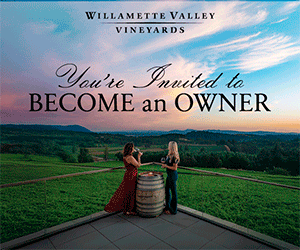Weddings or Winemaking?
By Diane Clerihue-Smith
Most of us never really give much thought to winery landuse zoning or what all those regulations entail. We visit a winery to taste wine, or to attend an event, and we enjoy the unique setting of the winery sometimes as much as we enjoy the unique character of the wines. But for some, it has been a difficult matter to decide what constitutes wine-related use of farmland, and agricultural use, and to understand how different wineries interpret those zoning laws.
There has been much confusion within the Oregon wine industry over what types of events wineries are legally allowed to host on vineyard land and what percentage of a winery’s revenue may come from non-wine events such as weddings and parties. Recently, the Oregon Legislature passed Bill 1055, which will bring uniformity to a patchwork of local and state regulations, and clarify which events are permitted and how much revenue may be generated from non-wine sales.
Over the years, farm and environmental groups have expressed concern that wineries were not adhering to their exclusive farm-use zoning (EFU). Events such as weddings and concerts, some suggested, went well beyond approved activities. The worry is that the wine industry is growing along with the popularity of the winery venues – many of which are unrelated to winemaking or grape growing. Some think this will erode the intent of EFU zoning. Without a doubt, Oregon’s grape growers and vintners are committed to preserve traditional rural vineyards and wineries, but they are also committed to remaining profitable. The idea of events centers replacing wineries is distasteful to most winemakers. But having the freedom to encourage wine sales with events that could create lasting consumer relationships is a freedom they do not want to lose.
All three interests — agricultural, environmental and viticultural — had a say in crafting SB 1055. The bill makes wineries a permitted, rather than conditional, use on land zoned for exclusive farm use. This change loosens some restrictions. The bill defines non-wine sales including: catered food, gift items, and private events which promote the sale of wine. These are called "incidental activities" and are limited at permitted wineries to 25 percent of the overall wine sales income.
I think it is good to have legal clarification on the subject, and was a wise compromise among all those interested in the outcome. Events can still be part of a winery’s business, but there will now be a limit to ensure that a winery’s main business remains making and selling wine.
No doubt there will be wineries that take issue with the restrictions. For example, I can’t imagine how this 25 percent rule will be monitored or enforced. Some large corporate wineries that depend heavily on revenue from events now lack legal permits and will have to make changes. But the new law will have little impact on those vintners who are committed to the craft and art of winemaking. Where I live here in the Umpqua Valley, all our wineries are family-owned and devote their time to the production of growing quality fruit and making quality wine, not to the production of … productions! Here in this magical world of the mom & pop winery and the hands-on winemaker, wine life continues just as before. And we like it that way.
Diane Clerihue-Smith and her husband H. Bruce Smith run “Oregon Wine Country Tours” based in the Umpqua Valley. Contact them at: www.owct.us or 1-866-WINEVAN









